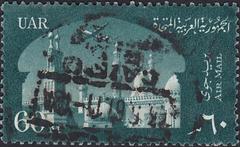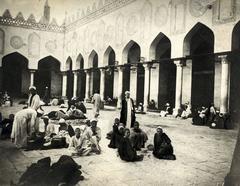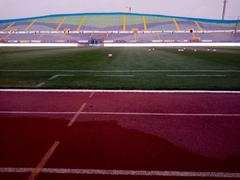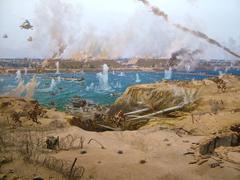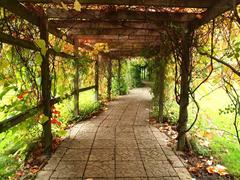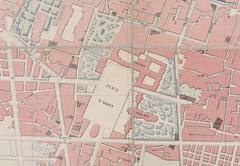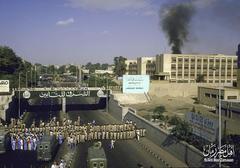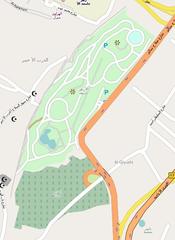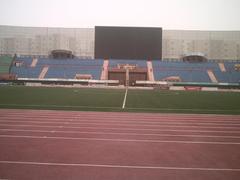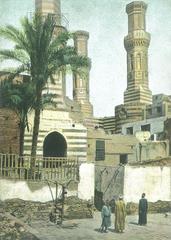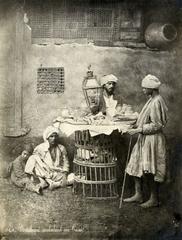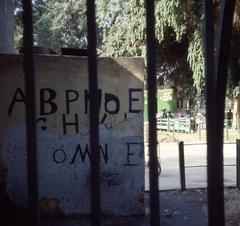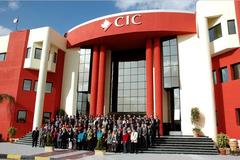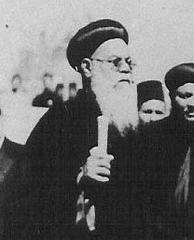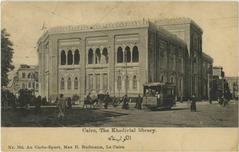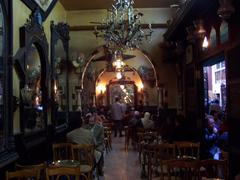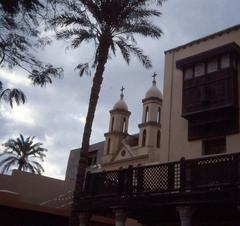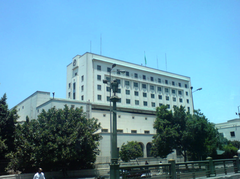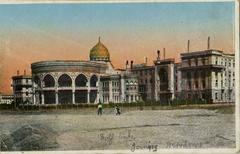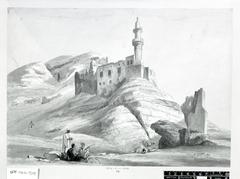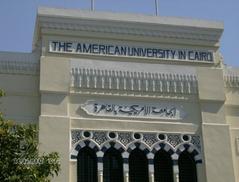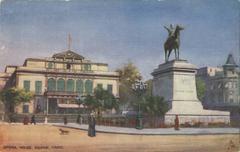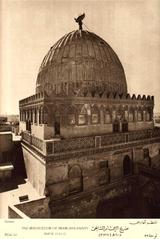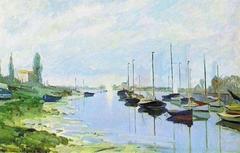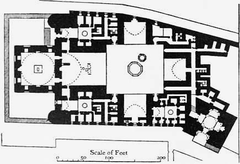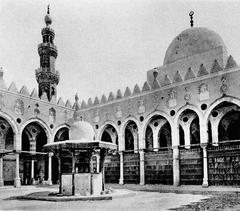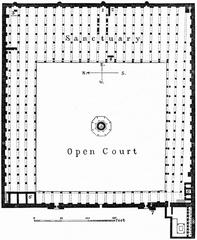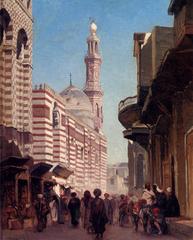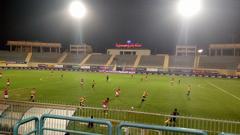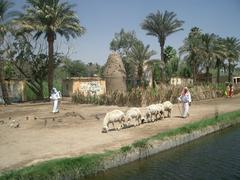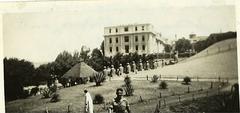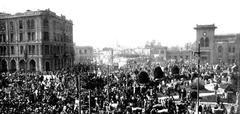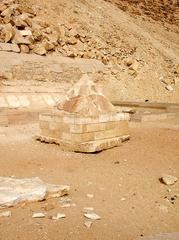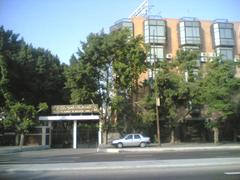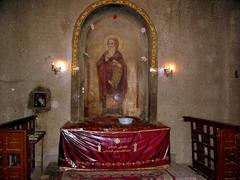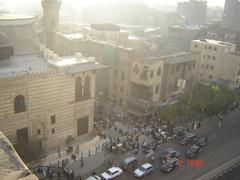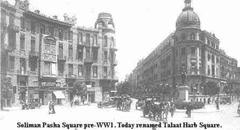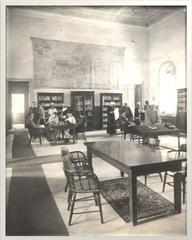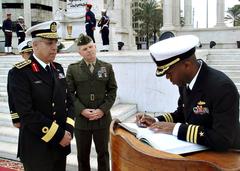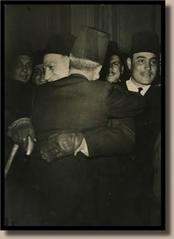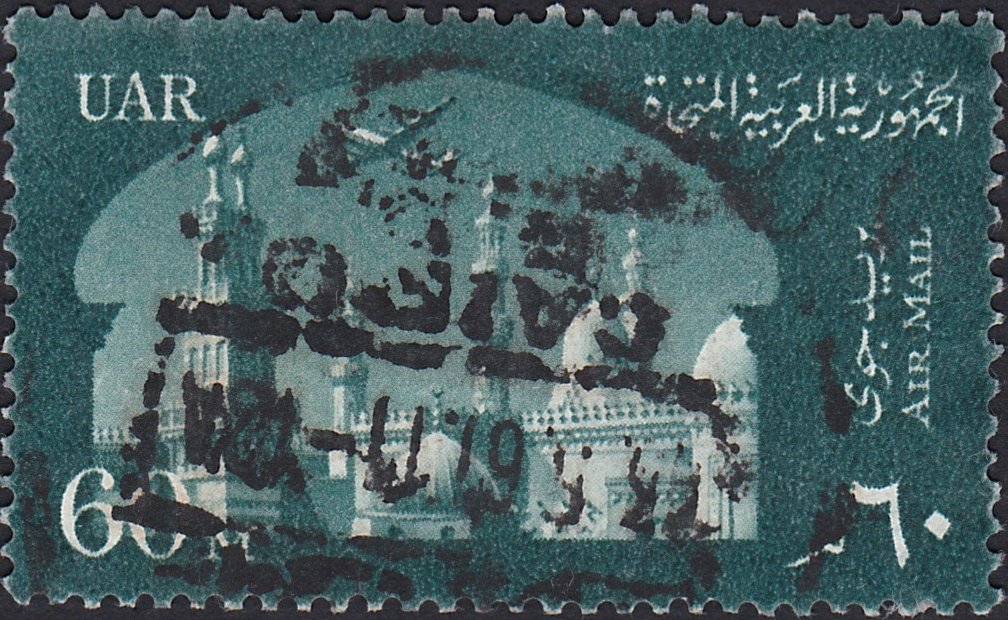
Al-Azhar University Visiting Hours, Tickets, and Comprehensive Guide to Cairo’s Historic Sites
Date: 14/06/2025
Introduction
Nestled in the vibrant heart of Islamic Cairo, Al-Azhar University and its adjoining mosque represent one of the world’s most enduring centers of Islamic scholarship and cultural heritage. Founded between 970 and 972 CE by the Fatimid Caliph Al-Mu‘izz li-Din Allah, Al-Azhar began as a mosque and quickly evolved into a prestigious university. It has continuously operated for over a millennium, serving as a beacon of Sunni Islamic learning and thought (Wikipedia). Today, Al-Azhar not only stands as an architectural marvel but also as a living institution, shaping Islamic jurisprudence, theology, and cultural dialogue on a global scale (study-in-egypt.gov.eg).
This guide compiles essential information for visitors—covering visiting hours, ticketing, guided tours, accessibility, travel tips, and nearby historic attractions such as Khan El Khalili bazaar and the Sultan Hassan Mosque. Whether you are a history enthusiast, spiritual seeker, or cultural traveler, this resource will help you navigate Al-Azhar and its surroundings with respect and appreciation for its profound legacy. For updates, consult the official Al-Azhar University website (azhar.eg) and reputable travel platforms (agatetravel.com).
Table of Contents
- Historical and Religious Significance
- Architectural Evolution and Styles
- Intellectual and Educational Impact
- Cultural and Social Influence
- Practical Visitor Information
- Nearby Attractions
- Visitor Experience: Tips and Highlights
- FAQ: Frequently Asked Questions
- Conclusion and Summary
- References and Useful Links
Historical and Religious Significance
Origins and Foundation
Established in 970–972 CE by the Fatimid Caliphate, Al-Azhar University is one of the oldest continuously operating universities worldwide (Wikipedia). The mosque was named in honor of Fatimah al-Zahra, daughter of Prophet Muhammad, and was created to serve as the spiritual and intellectual heart of Fatimid Cairo (study-in-egypt.gov.eg).
Evolution Through Dynasties
Originally a Shi’a institution, Al-Azhar transitioned to Sunni orthodoxy under the Ayyubids and Mamluks, who expanded its resources and facilities. The Ottomans further elevated Al-Azhar’s religious standing, introducing the office of Shaykh al-Azhar and reinforcing its leadership in Sunni Islamic scholarship (Wikipedia).
Modernization and Expansion
Al-Azhar underwent significant modernization in the 19th and 20th centuries, with reforms under President Gamal Abdel Nasser in 1961 introducing secular faculties such as medicine and engineering (Wikipedia). Today, it administers thousands of teaching institutes and serves millions of students across Egypt.
Architectural Evolution and Styles
Al-Azhar Mosque, the university’s anchor, is a masterpiece of Islamic architecture, reflecting more than a millennium of stylistic evolution (muslimheritage.com). Successive dynasties—including Fatimid, Ayyubid, Mamluk, and Ottoman rulers—expanded and embellished the mosque, resulting in a harmonious blend of architectural features.
Notable Architectural Features
- Minarets: Five minarets represent different eras: slender Fatimid forms, intricate Mamluk stonework, and ornate Ottoman domes (architecturecourses.org).
- Courtyard and Porticoes: A vast marble courtyard (sahn) is surrounded by arcaded porticoes with ancient columns and muqarnas ornamentation.
- Mihrab and Minbar: The prayer niche and pulpit are adorned with marble inlay, calligraphy, and woodwork, reflecting exquisite craftsmanship.
- Gates: Monumental gates like Bab al-Muzayinīn (Gate of the Barbers) feature elaborate stone carvings and inscriptions (muslimheritage.com).
University Complex
The university grew around the mosque, adding madrasas and libraries over centuries. The main library, with over 100,000 rare Islamic manuscripts, blends traditional and modern architectural elements (studyatuniversity.com).
Intellectual and Educational Impact
Al-Azhar is the leading authority in Sunni Islamic jurisprudence, theology, and education (alluniversity.info). Its Council of Senior Scholars represents all four Sunni madhahib and issues influential fatwas.
While Islamic studies remain central, Al-Azhar’s curriculum also encompasses medicine, engineering, humanities, and the social sciences. Its diverse student body—drawn from over 100 countries—creates a vibrant intellectual community and extends the university’s influence globally (agatetravel.com).
The university’s library preserves centuries of scholarly work, supporting research in both religious and secular domains (egyptimmigration.org).
Cultural and Social Influence
Role in Egyptian Society
Al-Azhar is integral to Egypt’s religious education and social life. The Grand Imam is a prominent figure in national and international religious affairs (alluniversity.info), and the university certifies imams across Egypt.
Promoting Tolerance and Understanding
Al-Azhar fosters dialogue and moderation among Islamic schools of thought, promoting intellectual inquiry and religious tolerance.
Preservation of Heritage
The mosque’s white marble façade, carved doors, and historic minarets exemplify Cairo’s Islamic heritage (egyptimmigration.org). Ongoing restoration projects ensure the preservation of this architectural treasure (academia.edu).
Practical Visitor Information
Location and Access
Al-Azhar is centrally located in Islamic Cairo, near Khan el-Khalili bazaar (mapcarta.com). It is easily accessible via:
- Metro: Nearest station is Ataba, followed by a short walk (TravelTriangle).
- Taxi/Ride-Sharing: Uber, Careem, and local taxis connect all city areas.
- Bus: Al Mosky bus stop on Port Said St is nearby.
Visiting Hours and Tickets
- Mosque: Open daily from 9:00 AM to 4:00 PM (hours may vary during Ramadan and religious holidays; closed during Friday noon prayers) (TravelTriangle).
- Tickets: Entry is generally free, but some guided tours may charge a fee. Foreign visitors may pay a nominal entrance fee (e.g., 60 EGP), while Egyptians pay less (confirm current rates before visiting).
Dress Code and Etiquette
- Men: Long trousers, sleeved shirts; shorts and sleeveless tops discouraged (Timeless Tours).
- Women: Loose, long dresses or skirts, covering arms and legs; headscarf recommended (TourTeller).
- Inside the Mosque: Remove shoes before entering prayer halls. Remain quiet and respectful, especially during prayers. Follow all posted photography and visitor rules (Egypt Planners).
Accessibility
- Some areas are wheelchair accessible, but historic sections may present challenges (Egypt Planners). Contact the visitor center ahead for assistance if needed.
Facilities and Amenities
- Restrooms are limited inside; nearby cafes or hotels are recommended.
- Markets like Khan el-Khalili offer souvenirs and refreshments.
- Cafes and restaurants are abundant in the area, especially lively after sunset during Ramadan.
Nearby Attractions
Al-Azhar’s location in Islamic Cairo makes it a perfect starting point to explore:
- Khan el-Khalili Bazaar: Famed for crafts, spices, and souvenirs.
- Al-Muizz Street: Lined with medieval mosques and palaces.
- Al-Hussein Mosque: A spiritual and historical landmark nearby.
- Sultan Hassan Mosque: Renowned for its monumental architecture.
Exploring these sites alongside Al-Azhar provides a fuller experience of Cairo’s rich heritage (studyatuniversity.com).
Visitor Experience: Tips and Highlights
- Guided Tours: Enhance your visit with a local guide for historical context (Egypt Planners).
- Best Times to Visit: Weekday mornings are quieter; avoid Friday prayers.
- Photography: Allowed in most areas, but avoid using flash or photographing during prayers.
- Dress and Behavior: Dress modestly and be mindful of local customs.
- Stay Hydrated: Bring bottled water; use sunscreen.
FAQ: Frequently Asked Questions
Q: What are Al-Azhar Mosque’s visiting hours?
A: Typically 9:00 AM to 4:00 PM, excluding prayer times and certain holidays.
Q: Is there an entry fee or ticket cost?
A: Entry is generally free; guided tours or special exhibitions may have fees.
Q: Are guided tours available in English?
A: Yes, local guides are available and often speak English; booking ahead is recommended.
Q: Is Al-Azhar accessible for people with disabilities?
A: The mosque is partially accessible; contact ahead for assistance regarding mobility needs.
Q: Can non-Muslims enter the mosque?
A: Non-Muslims may visit certain areas; some parts may be restricted. Always respect staff guidance.
Q: Is photography allowed?
A: Allowed in most public areas, but restricted in some sacred spaces. Observe all posted signs.
Conclusion and Summary
Al-Azhar University and Mosque stand as monumental testaments to over a millennium of Islamic scholarship, architectural artistry, and cultural vitality within Cairo’s historic landscape (muslimheritage.com). Visitors can expect a richly layered experience—admiring the mosque’s minarets, decorated prayer halls, and engaging with living traditions of Islamic learning that continue to shape religious thought worldwide.
Practical considerations such as modest dress, respectful behavior, and awareness of accessibility ensure a smooth visit. Guided tours are highly recommended for deeper understanding. Exploring nearby attractions like Khan El Khalili and Al-Hussein Mosque rounds out the journey, providing a window into the vibrant fabric of Islamic Cairo (studyatuniversity.com).
As both a spiritual sanctuary and an academic institution, Al-Azhar invites travelers to appreciate its ongoing contributions to interfaith dialogue, cultural preservation, and intellectual inquiry. Plan your visit thoughtfully by consulting official resources, and consider downloading the Audiala app for current visitor information and exclusive guided tour offerings. Engage with Cairo’s rich heritage attentively, ensuring your journey to Al-Azhar is enlightening and memorable (azhar.eg).
References and Useful Links
- Al-Azhar University (Wikipedia)
- Study in Egypt: Al-Azhar University
- Muslim Heritage: Architecture of Al-Azhar Mosque
- Agate Travel: Al-Azhar University, Cairo
- Study at University: Al-Azhar University in Egypt
- Egypt Immigration: Mosque in Egypt, Cairo
- Travel Triangle: Al-Azhar Mosque
- Timeless Tours: Cultural Etiquette in Egypt
- TourTeller: Things to Know Before Visiting Egypt
- Egypt Planners: Al-Azhar Mosque
- Lonely Planet: Things to Know Before Traveling to Cairo
- Official Al-Azhar University Website
